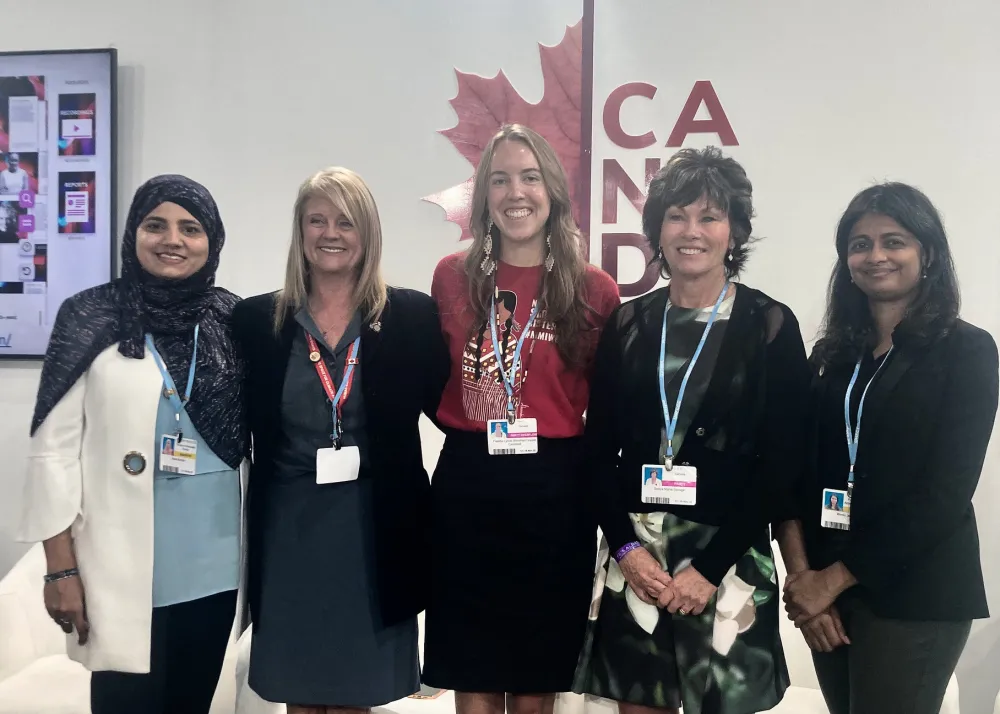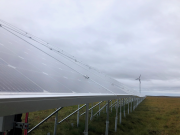On November 14, 2022, the Pembina Institute hosted a roundtable at the Climate Change Conference (COP27) in Sharm el-Sheikh, Egypt. The roundtable, Women Leading Energy, brought together a diverse group of Canadian speakers and stakeholders with a shared interest in placing equity at the centre of decision-making in today’s and future energy systems.
Speakers included Catherine Stewart, Canada's Ambassador for Climate Change; Hon. Sonya Savage, Alberta’s Minister of Environment and Protected Areas; Freddie Huppé-Campbell, Indigenous Clean Energy; Aisha Bukhari, Women in Renewable Energy; and Michelle Johnston, Society of United Professionals. It was moderated by the director of our electricity program, Binnu Jeyakumar.
The focus on gender at COP27 and this session is evidence of an evolving conversation within Canada and around the world on the urgent need to humanize climate science and its impacts to our society and environment, while tackling the technical concerns that often dominate the conversation on energy transition.
Participants noted this momentum, pointing to the enthusiastic uptake of the Equal By 30 campaign since its launch in 2018 as evidence of rising interest in linking the opportunities of energy transition and the fight for gender equity. They also spoke to the importance of seeing more women leading in energy and climate spaces.
Despite these indicators of hope, an energy of concerned urgency captivated the conversation.
We need to be honest about the persistent gender-based inequities in energy.
While massive strides have been made in bringing a gender lens to climate conversations and action, we have a long way to go. Approaching this challenge with an attitude of honesty about inequities of the past and present is a critical first step.
Leaders highlighted several areas to target action. They named lack of access to capital as a significant ongoing challenge for women seeking to break into net-zero fields, emphasizing the transformative impact of funding for students and entrepreneurs alike. Participants reiterated that physical and psychological safety must be a foundational priority, all the way from high school to the boardroom. Finally, they pointed to intersectionality as the only path forward, arguing that measures to disrupt gender inequity must also address other forms of marginalization.
These sentiments confirm findings from our research: that continued under-representation of women in energy is a product of structural and cultural barriers to success, including lack of access to opportunity, lack of good jobs, inability to advance, a persistent income gap and a hostile industry culture.
Innovative solutions are needed. This means broadening the scope of net-zero knowledge, skills and career paths.
Addressing the complex, systemic issues of climate change and gender inequity will require a diverse range of perspectives, skills and solutions.
Participants in the roundtable discussion emphasized that decision-makers must be open to different paths to reaching the outcomes that women want to achieve. This means integrating different forms of knowledge in the energy transition, including engaging Traditional Ecological Knowledge and broadening from STEM to STEAM (Science, Technology, Engineering, Arts and Math) , in order to incorporate the arts.
It was also noted that designing an inclusive energy workplace will require rethinking ingrained assumptions about leadership, training and capacity. For example, attracting and retaining women will require forward-thinking approaches to parental leave, flexibility and leadership training.
These solutions are very much in line with those in our Equitable Net-Zero report, which outlines ten recommendations for advancing gender equity in Alberta’s shift to net-zero.
Conversation must be matched with action.
A key theme from this year’s COP is a commitment to advancing from planning and negotiations towards implementation. In other words, we need to start moving from pledges to progress.
With so many “wrongs” to “right” it can be easy to lose focus and direction. However, participants emphasized that good ideas mean nothing without action. The next one to two years will be a critical period to implement concrete changes to our energy systems. These changes must have equitable outcomes embedded into their designs, with women leading at all stages of implementation.
As 2022 comes to an end, we are actively thinking about and planning the Pembina Institute’s gender equity work in 2023. We will be hosting an event in March, in advance of the Alberta election, during which we will discuss how Alberta can take advantage of the opportunity that energy diversification offers for gender equity. The outcomes from that workshop will work to drive real policy change in the traditional and renewable energy spaces to accelerate diversity and equity in Alberta’s energy sector.
Thank you to our partners, Women in Renewable Energy (WiRE) and GLOBE Series for their collaboration on the Women in Energy Transition dialogue series and Women in Energy Transformation website and special thanks to our partners Enbridge, Natural Resources Canada, Shell and TD for this phase of the series.









